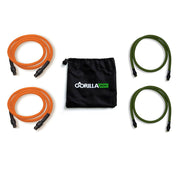What Is Sleep Latency?

Waking up early and getting in a good workout is a great way to start the day. But sleepless nights, tossing and turning, or unsatisfying sleep schedules can make it feel exhausting to work out. Some days, you might even skip the resistance band workout in favor of a few extra zzz’s.
Eating right and exercising are hugely important factors in living a healthy lifestyle and improving your overall physique. However, getting the right amount of sleep is equally necessary. If you’re struggling to fall asleep every night, you might have late-onset sleep latency.
So what exactly do those words mean? It’s not as bad as you may think, and the good news is that some small changes to your daily routine might be able to fix it.
Here’s everything you need to know:
Wait and See Sleep Latency
It happens to the best of us every now and then. You snuggle up in bed for a good night’s rest, but for some reason, you just can’t seem to fall asleep. It feels too hot, you can’t get comfortable under the covers, or every noise seems to bother you. And while this is normal every now and then again, it might become a problem if it’s happening often.
Sleep latency by itself isn’t necessarily a bad thing; it just refers to how long it takes you to fall asleep each night. The average person takes about 10 to 20 minutes to drift into slumber from the moment their head hits the pillow.
People who take more than 20 minutes to fall asleep might have insomnia, which is a sleep disorder marked by the inability to fall asleep. However, too short of sleep latency is a bad thing too. Falling asleep in less than eight minutes may be a result of sleep deprivation, letting you know that it’s time to catch some more zzz’s each night.
Effects of Sleep Latency
Sleep latency can vary from night to night. If you do a particularly calorie-burning HIIT routine one day, you’ll probably fall asleep faster that night when compared to any other average day. However, sleep latency can be a really great indicator of your sleep health overall.
Falling asleep too quickly, or taking too long to fall asleep, can all have an effect on your general health.
Sleep Latency and Sleep Stages
When you fall asleep, your body goes through multiple stages. Each one has its own purpose, and hitting all of them for the proper amount of time is key for waking up feeling refreshed.
Long sleep latency can delay the amount of time it takes to enter the first stage. If you fall asleep later than planned, but you still need to wake up to your early morning alarm, you may not experience every stage to its full extent.
This may cause something called REM rebound, which has nothing to do with basketball. Instead, it refers to the compensatory increase in depth and intensity of the REM phase. This is common after significantly stressful life events or due to sleep deprivation.
The rapid-eye-movement (REM) phase is arguably the most important for feeling rested, but spending too long in it can have adverse effects upon waking.
Sleep Debt and Sleep Latency
Having a short sleep latency of fewer than eight minutes is not a bad thing in itself. However, it can be a sign that you’re not getting enough sleep in general. Sleep debt is the amount of time sleeping that you’ve missed.
Not getting enough sleep can have some serious effects on your health. These include short-term effects like decreased alertness, impaired memory, mood swings, and stress. But it can also lead to long-term problems like increased risk of stroke, heart attack, or high blood pressure.
If you’re feeling sleepy during the day, how are you going to have the energy to complete your perfect at-home workout? Making sure you’re spending enough time in bed is essential to ensure your health and safety outside of it.
Sleep Latency and Sleep Quality
If you’re one of those people who lay in bed for an hour scrolling on TikTok before actually falling asleep, you may have a poor sleep efficiency ratio. This is the amount of time you spend asleep divided by the amount of time you spend in bed. Typically, it should be 85% or over.
Not getting enough sleep can have a negative effect on sleep quality, and if you’re spending too much time prolonging your slumber each night, you may wake up feeling grumpy, unsatisfied, and unmotivated to take on the day.
Pro Tips for Getting Better Sleep
It’s not just about falling asleep within the right time period. It’s also all about having a good quality of sleep from start to finish. Getting better sleep can have a seriously positive effect on your mood, cognition, and, most importantly, your workout sessions.
Exercise Those Untired Eyes
Exercise has more benefits than we’d ever be able to fit in a single article. But one of the most profound effects that working out can have is an improvement to your sleep quality.
Researchers don’t completely understand why exercising can help you fall asleep faster and get better sleep quality, but there is evidence to prove that it’s true. And the relationship is mutual, as getting good sleep leads to higher activity levels in general.
With that said, the timing of your workouts may matter. Aerobic activity, like running, HIIT routines, or rowing, releases endorphins, which are the feel-good chemicals. These increase your alertness and give you that amazing rush every time you work out.
But with that said, you don’t want that energy before you hit the hay. If you’re a cardio night owl, just make sure you’re doing all of your routines at least an hour or two before bed.
However, the time of day really doesn’t matter. As long as you’re consistently putting in the work, your Gorilla Bow routines may be able to rejuvenate your sleep schedule.
A Healthy Diet for Peace and Quiet
It doesn’t matter how much time you put into your exercise regimen if your diet doesn’t match up. Eating right is equally important to working out, and it might have a direct effect on the quality of your sleep.
Nutrition and sleep go hand in hand, and eating a balanced diet that’s high in key nutrients is essential. Studies have found that individuals who lack certain vitamins like vitamin A, C, D, E, and K are associated with sleep problems. Not to mention, indigestion and other stomach problems related to a poor diet can make it difficult to fall asleep at an appropriate time.
If you’re having sleep issues, or your sleep latency seems to be a bit off, you might want to try loading up on more veggies, fruits, complex carbs, and proteins.
Self-Care Routines
It’s also possible that you’re falling asleep too late or too early because of other stressors going on in your life. Stress can have a significant impact on your sleep, so it’s important to deal with it properly.
Each night, engage in a routine that makes you feel calm and relaxed to improve your quality of sleep. Watch a favorite television show, catch up on a good book, take a hot bath, or meditate. Whatever it takes to reduce your stress and improve your slumber.
Don’t Sleep On It
While abnormal sleep latency is fine every now and then, it might be a sign that something you’re doing during the day isn’t adding up. If you’re falling asleep too quickly, it might be time to hit the lights a bit early. And if you’re having trouble falling asleep, it may be insomnia, too much caffeine, or another underlying factor.
Regardless, frequent exercising, a healthy diet, and self-care routines can have a hugely positive impact on your sleep quality. In turn, you’ll be better prepared to take on whatever the day has in store.
For more tips and tricks for living a healthier, fuller life, the Gorilla Bow All-Access Membership has everything from live and on-demand classes to nutrition and fitness tips. It’s like a personal trainer without the fees or the hassle.
Sources:
How Sleep Latency Impacts the Quality of Your Sleep | Sleep Foundation
Nutrition and Sleep: Diet's Effect on Sleep | Sleep Foundation











Leave a comment